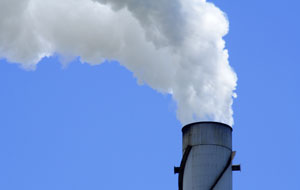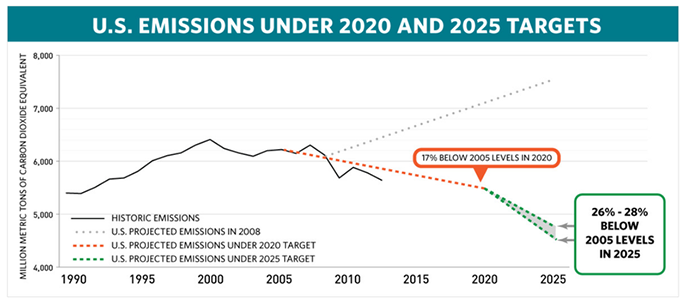US outlines how it will cut 28 percent of greenhouse gas emissions by 2025
 The United States began to outline today how it will achieve the goal of cutting greenhouse gas emissions by 28 percent by the end of 2025. In a submission to the UN Framework Convention on Climate Change, the United States says that it will use executive actions, largely under the Clean Air Act, to cut carbon pollution from new and existing power plants, improve fuel economy standards, and limit methane emissions from landfills and the oil and gas sectors. The submission comes ahead of a UN climate conference in Paris meant to coordinate a global response to climate change and prevent the Earth from warming more than 2 degrees Celsius, a widely accepted target for limiting the effects of warming.
The United States began to outline today how it will achieve the goal of cutting greenhouse gas emissions by 28 percent by the end of 2025. In a submission to the UN Framework Convention on Climate Change, the United States says that it will use executive actions, largely under the Clean Air Act, to cut carbon pollution from new and existing power plants, improve fuel economy standards, and limit methane emissions from landfills and the oil and gas sectors. The submission comes ahead of a UN climate conference in Paris meant to coordinate a global response to climate change and prevent the Earth from warming more than 2 degrees Celsius, a widely accepted target for limiting the effects of warming.
“The United States’ target is ambitious and achievable, and we have the tools we need to reach it,” Brian Deese, a senior advisor to President Obama, writes in a blog post. “The goal will roughly double the pace at which we’re reducing carbon pollution through cost-effective measures using laws already on the books.”
The United States’ emissions targets are based on 2005 measurements. The US says that it’s already on target to reduce emissions 17 percent by 2020. Reaching 28 percent by 2025, it says, will require a “substantial acceleration” of the current pace of reductions. The US says that it’s going to “make best efforts” to reach the 28 percent goal — it is otherwise committed to reaching at least a 26 percent reduction.
The Obama administration wants to have new carbon limits on power plants by this summer and new fuel emissions standards for heavy-duty vehicles after 2018. Another contribution to this plan came last week, when the administration mandated that federal government operations reduce emissions 40 percent by 2025 — they have already been reduced by 17 percent.
The administration intends to implement these changes in ways that will not be easy for Republicans to later reverse, should they take control of the White House. “The undoing of the kind of regulations that we are putting in place is something that is very tough to do,” says Todd Stern, a State Department climate change representative, according to the Guardian. “The kind of regulation we are putting in place does not get easily undone.”
Naturally, these changes are being made through executive action, since the Republican-controlled Congress is highly unlikely to pass legislation meant to combat climate change. The New York Times reports that Secretary of State John Kerry is going so far as to make sure that the Paris agreement does not qualify as a treaty, which would require ratification in the Senate. Republicans are, unsurprisingly, opposed to the plan, calling it potentially illegal and likely to kill jobs.

Immediate action on climate change has become critical. Over the past two years, UN scientists have issued a series of devastating reports basically saying that the world will be in very bad shape if dramatic greenhouse gas reductions are not made immediately. One report warned of severe food shortages. Another report said that potentially irreversible damage would be felt globally, hurting infrastructure and economies. Basically: meaningful action is incredibly important.
Most countries involved in the UN agreement have not yet submitted outlines, despite an end-of-March deadline. The administration is still touting its success, however, noting that countries representing 58 percent of global carbon emissions have announced their post-2020 reduction goals. Notably, that includes China, which plans to reach peak carbon emission levels by 2030. The Times reports that other countries may deliver their plans in June, if not later. Specifics of the climate change agreement will be made in Paris this December.
You can return to the main Market News page, or press the Back button on your browser.

